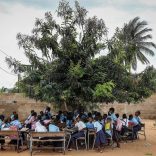Chinese medical team donates surgery instruments to Mozambican hospital
Mozambique: Primary school pupils absent for 39% of classes – UNICEF

FILE PHOTO - For illustration purposes only. [File photo: Lusa]
- According to the research, “only 48% of primary school pupils are in the right year according to their age”.
Primary school children in Mozambique “are absent from school 39 per cent of the time,” on average, according to a report released Thursday by the United Nations Children’s Fund (UNICEF).
The work is the result of the Longitudinal Assessment of School Dropout (ALDE), the first survey of its kind on children in primary education in the country, the UN agency said.
According to the research, “only 48% of primary school pupils are in the right year according to their age”.
The work portrays inequalities in terms of regional distribution and wealth, which are reflected in school performance.
Only 46 per cent of children in rural areas have a curriculum progression according to their age, the report indicates, in contrast with the cities, where the majority (65 per cent) are aligned with this goal.
On the other hand, “the poorest children are three times more likely to lag far behind in school (four or more years) compared to their wealthier peers,” UNICEF adds.
The assessment results from a collaboration between the Pedagogical University (UP) and the Mozambican Ministry of Education and Human Development.
From the same work also resulted a report on the impact of Covid-19, according to which “access and use of learning materials and resources was very limited”.
“Only 16% of pupils received exercise sheets from the teacher,” it concluded.
The data is released just before the start of the school year, scheduled for 31 January.
- You may read / download the “Rapid assessment of students’ learning during COVID-19” by UNICEF Mozambique HERE
76% of caregivers were concerned about the situation of their children during school closure, including falling behind in education (28%) & insufficient food (7%). #ALDEMOZ https://t.co/zgvK4YgBym pic.twitter.com/LrtE9e5biy
— UNICEF Moçambique (@UNICEF_Moz) January 20, 2022












Leave a Reply
Be the First to Comment!
You must be logged in to post a comment.
You must be logged in to post a comment.